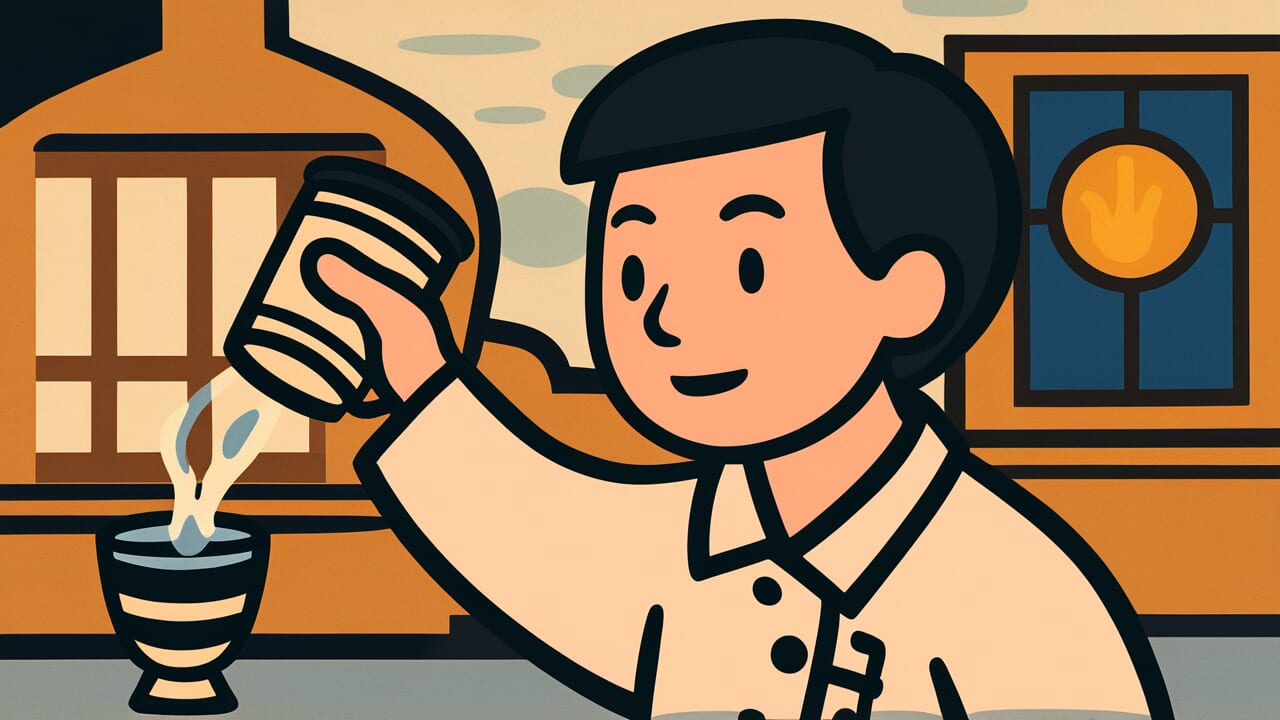How to Read “Alcohol should be drunk and should not be drunk”
Sake wa nomu beshi nomu bekarazu
Meaning of “Alcohol should be drunk and should not be drunk”
This proverb means that alcohol should be enjoyed in moderation, but you should not drink too much.
It doesn’t completely reject drinking. Instead, it encourages drinking in reasonable amounts while warning against excess.
You can use this saying when encouraging self-control at drinking parties or when giving advice about drinking habits.
It’s especially useful when explaining how to balance enjoyment with moderation.
The reason for this expression is that alcohol has two sides. It can relax the mind and smooth social relationships.
But drinking too much harms your health and impairs your judgment. Rather than simply saying “don’t drink,” this proverb takes a positive approach.
It says “enjoy it moderately” while also teaching the importance of self-control. Even today, people understand this as a lesson that too much of anything is as bad as too little.
Origin and Etymology
The exact origin of this proverb in historical texts hasn’t been identified. However, we can make interesting observations about its structure.
This expression places two contradictory commands together: “should be drunk” and “should not be drunk.”
This is considered a type of classical Japanese rhetorical device called paired phrases. By placing seemingly contradictory commands side by side, it actually expresses the spirit of moderation.
In Japan, alcohol has long been essential in religious ceremonies. It has also been deeply rooted in people’s daily lives as a favorite drink.
From aristocrats in the Heian period to common people in the Edo period, many stories about alcohol remain.
Throughout these stories, one lesson appears repeatedly. Alcohol has two faces: enjoyed moderately, it enriches life, but in excess, it destroys you.
This expression format resembles Zen dialogue, a distinctly Japanese way of conveying wisdom.
It doesn’t say “drink” or “don’t drink.” By presenting both at once, it makes listeners think for themselves and realize the middle path.
This contains a deep intention. Rather than simple prohibition or recommendation, it teaches the importance of self-management.
Usage Examples
- Today was fun, but “alcohol should be drunk and should not be drunk,” so I’ll stop around here
- He understands that “alcohol should be drunk and should not be drunk,” so he always goes home pleasantly tipsy
Universal Wisdom
“Alcohol should be drunk and should not be drunk” addresses the eternal theme of “pleasure versus self-control” that humans constantly face.
We humans have an instinct to seek enjoyable and pleasant things. But we also know the reality: if we completely surrender to those desires, we will pay a price.
This proverb has been passed down for hundreds of years because it captures this essential human conflict.
Through the concrete example of alcohol, it actually conveys a truth that applies to every aspect of life.
What’s interesting is that this proverb doesn’t say “don’t drink.” It doesn’t reject human desires outright.
Instead, it acknowledges them and teaches wisdom about how to control them. This is based on a deep understanding of human nature.
Perfect self-control is impossible and unnecessary. What matters is the balance between enjoyment and moderation.
Our ancestors understood this truth. The truly difficult thing in life isn’t completely abstaining from something.
It’s disciplining yourself while enjoying things moderately. This delicate sense of balance is the mark of a mature adult and the key to a happy life.
When AI Hears This
In quantum mechanics, particles exist in multiple states simultaneously until observed. This proverb actually has the same structure.
The contradictory commands “should be drunk” and “should not be drunk” exist simultaneously. Only through the actual act of drinking does one become definite.
What’s interesting is that this determination isn’t binary but continuous.
Just as a quantum wave function collapses upon observation, the meaning of this proverb changes smoothly depending on the observation parameter: the amount drunk.
With the first sip, “should be drunk” manifests at 99 percent. By the tenth cup, “should not be drunk” becomes 99 percent dominant.
In other words, this proverb exists not as discrete right or wrong, but as a probability distribution.
More importantly, the state of the observer—the drinker—also affects the result.
Just as measuring devices and measured objects interact in quantum mechanics, the definition of “moderate amount” changes based on a person’s constitution, situation, and mental state.
One cup might be “should be drunk” for one person but “should not be drunk” for another.
This proverb isn’t just a moral lesson. It’s a surprisingly scientific statement expressing the nature of situation-dependent truth.
Lessons for Today
This proverb teaches us the importance of “moderation” that applies to every aspect of life.
In modern society, we’re surrounded by things we can easily get absorbed in: not just alcohol, but smartphones, social media, work, and entertainment.
All of these enrich our lives when enjoyed moderately. But when taken to excess, they steal our health, relationships, and time.
The important thing is not to deny enjoyment. You don’t need to completely abstain.
Rather, enjoy things moderately while maintaining a sense that you’re in control. This also contributes to mental health.
What in your life could be described as “should be drunk and should not be drunk”?
Finding and becoming aware of it is the first step. Then, enjoy when you enjoy, and stop when you stop.
By creating this rhythm, your life will become more fulfilling. Disciplining yourself isn’t restrictive.
It’s actually wisdom for enjoying things longer. Let’s apply this teaching from our ancestors to modern living.



Comments